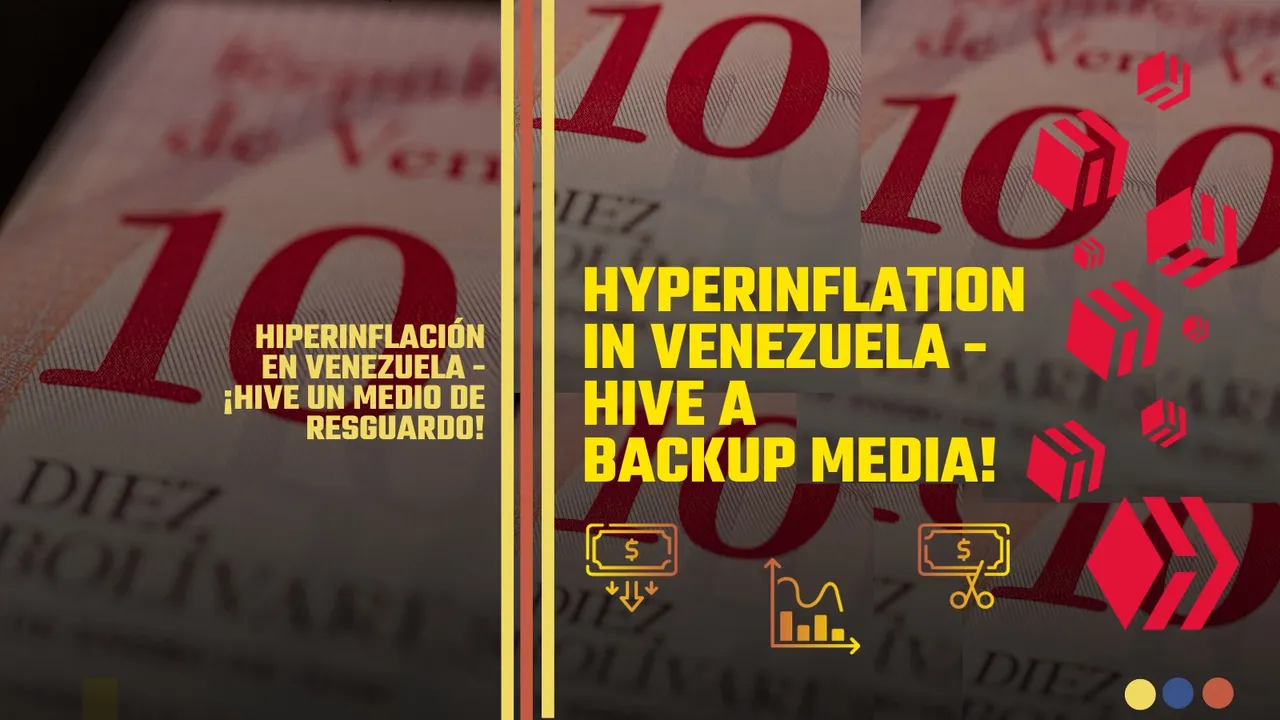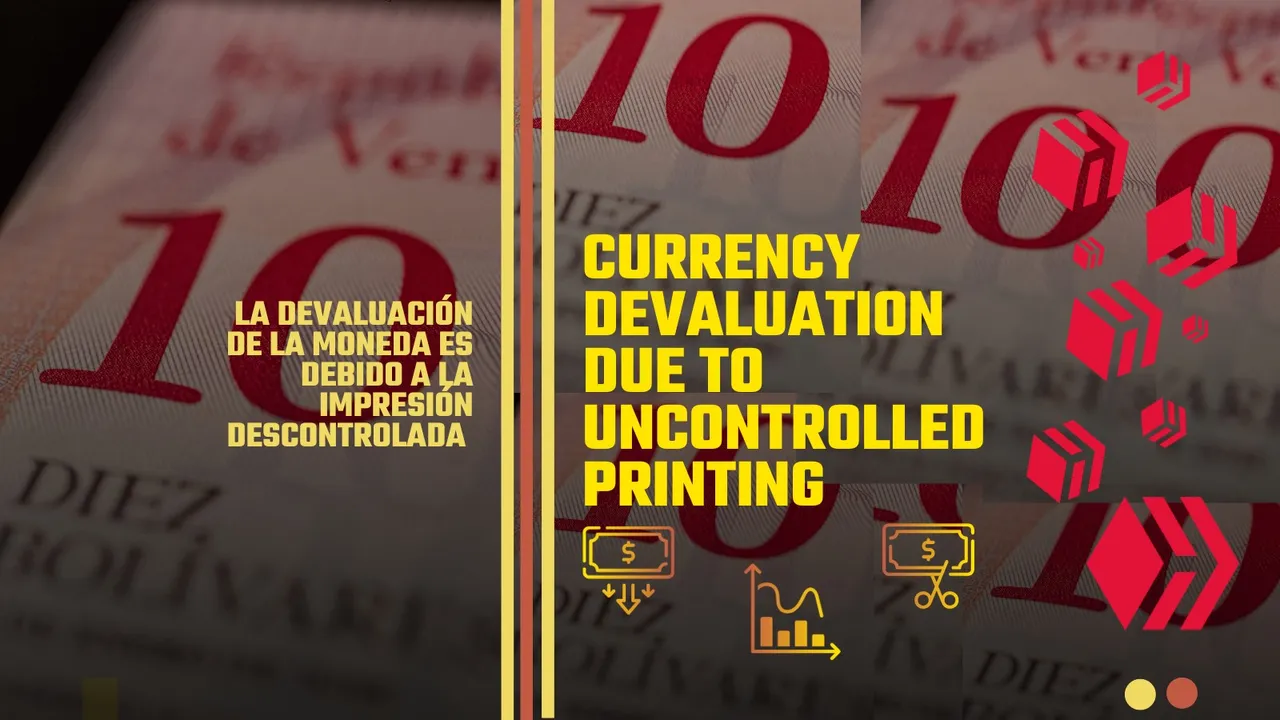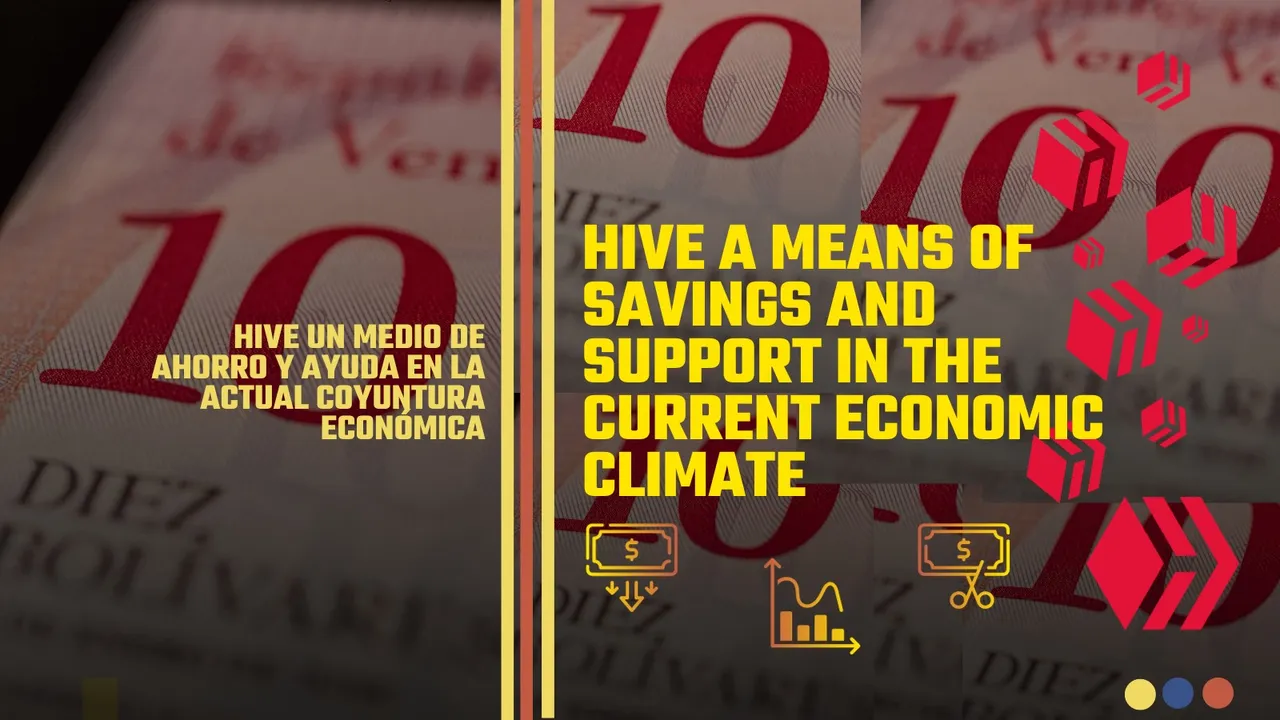
Made in Canva | Hecho en Canva / Source | Fuente: Iván Díaz/ Unsplash

You may ask yourself how a Venezuelan can live in Venezuela under such a crippling monetary situation (INEFFICIENT monetary policy / UNCONTROLLED currency issuance). This is one of the hardest contexts to assimilate. In my country, there have been a series of devaluations. Each one has been worse than the other and has demolished the saving capacity of every Venezuelan.
A society that cannot save does not have purchasing power, and in effect, its consumption preferences decrease. The bolivar has been the official Venezuelan currency since 1879, and in my opinion, this is one of the most blunderous mistakes in our history. Before the bolivar was declared legal tender, the country's currency was called the peso. Although the bolivar had a period of splendor, it is more appropriate for a country to be managed by free banking or the exchange of currencies without taxes. This allows for greater economic growth.
Anyway, the fact is that since 1997, the bolivar has increased its period of monetary and exchange rate instability. Of course, the currency had already been unstable since 1961, especially on February 18, 1983 (Black Friday). However, in the 21st century, the currency lost purchasing power, and its parity against the dollar progressively increased. This is something that few can assimilate, since Venezuela received an astronomical amount of foreign currency for oil exports from 1997 to 2012. Where is it? Don't ask me, the only thing I know is that none of this money reached the hands of the people, public spending decreased, infrastructure works were paralyzed (many of them were not even built), and the only thing we all know is that there is a great deal of embezzlement. This is a brief summary. I do not want to delve too much into this in this post.
I particularly have lost count of how many monetary reconversions we have lived through; indeed, you are even confusing yourself by saying the amounts due to the identical bills issued by the mint (the paper bills are more expensive, i.e., worth more than what you can buy with them).
Se preguntará usted cómo puede un venezolano vivir dentro de Venezuela bajo unas circunstancias agobiantes monetariamente (política monetaria INEFICIENTE /emisión de moneda DESCONTROLADA). Éste es uno de los contextos más duros de asimilar. En mi país han ocurrido un conjunto de devaluaciones. Cada una de ellas ha sido peor que la otra y ha demolido la capacidad de ahorro de cada uno de los venezolanos.
Una sociedad que no puede ahorrar, no posee poder de compra y en efecto sus preferencias de consumo disminuyen. El bolívar es la moneda oficial venezolana desde el año 1879, y a mi modo de ver, es uno de los errores más garrafales de nuestra historia. Antes de declararse el bolívar como moneda de curso legal, la moneda del país se llamaba peso. Nombre o alocución correcta, aunque el bolívar llegó a tener una época de esplendor, lo más adecuado es que un país se maneje por banca libre o intercambio de monedas sin gravámenes. Esto permite un mayor crecimiento económico.
En fin, el asunto es que desde 1997 el bolívar aumentó su periodo de inestabilidad monetaria y cambiaria. Claro, ya la inestabilidad de la moneda venía desde 1961, y en especial 18 de febrero de 1983 (viernes negro). No obstante, en el siglo XXI la moneda perdió poder de compra y su paridad frente al dólar aumentó progresivamente. Esto es algo que pocos pueden asimilar, ya que Venezuela recibió por concepto de exportación de petróleo desde 1997, a 2012 una suma astronómica de divisas. ¿Dónde están? No me lo pregunte, lo único que yo sé es que nada de este dinero llegó a manos de la gente, el gasto público disminuyó, las obras de infraestructuras están paralizadas (muchas ni se construyeron), y lo único que todos sabemos es que existe un gran desfalco. Esto es una breve síntesis. No quiero ahondar mucho de esto en este post.
Yo particularmente he perdido la cuenta de cuantas reconversiones monetarias hemos vivido, es más hasta te confundes al decir los montos debido a los idénticos billetes que emite la casa de la moneda (el papel de los billetes es más caro, es decir, vale más de lo que puedes comprar con ellos).


Made in Canva | Hecho en Canva / Source | Fuente: Iván Díaz/ Unsplash

Many Venezuelans have to work two, three, or four jobs to be able to afford their expenses. A reality that no one escapes, the minimum wage in Venezuela is about 5 US dollars, while the average real wage is between $150 and $190 US (this for the year 2023, before was less, much less). The minimum wage is not the same as the real wage. Is it possible to live with this in Venezuela? The answer is no. Most who manage to get a hard currency job, must have a high level of professionalism, and the other problem is the price of goods. Ironically, every one of them is priced in dollars.
A couple of years ago, prices in Venezuela were reflected in bolivars, therefore, they changed twice a day. There was a period when they changed every hour or even less. Now prices are fixed in dollars, and you pay in thousands of bolivars that are worthless. That is the reality, which, by the way, is very burdensome.
In my case, I had to learn to take refuge in cryptocurrencies or hard currency (reliable or non-depreciating currency). There was a period that was disastrous. No human being deserves to live in this context. Cryptocurrencies are an efficient backup that, if you know how to manage them, can help you counteract the effects of the most nefarious tax caused by the State: Hyperinflation. Fortunately, Hive also provides thousands of Venezuelans, including me, with a great help. It is a protective measure since the country is controversial, and you don't know what can happen.
Another reality is that we all learned to live with the appraisal systems. There is a page on social networks and even apps in the Play Store that express the various prices of the dollar in bolivars. It changes between 9:00 a.m. and 1:00 p.m. on weekdays. Why do they change only on these days? The answer is simple, the Banco de Venezuela injects foreign currency into the market only on these days and updates the price during the hours I mentioned. Crazy!
Muchos venezolanos tenemos que trabajar dos, tres o cuatro trabajos para poder costear nuestros gastos. Una realidad de la que nadie escapa, el salario mínimo en Venezuela es de unos 5 $ estadounidenses, mientras que el promedio del salario real ronda entre los 150 $ a 190 $ (esto para el año 2023, antes era menos, mucho menos). Salario mínimo no es lo mismo que salario real. ¿Se puede vivir con esto en Venezuela? La respuesta es que no. La mayoría que logra conseguir un trabajo de moneda dura, debe tener un alto nivel de profesionalización, y el otro problema es el precio de los bienes. Irónicamente, cada uno de ellos son tasados en dólares.
Hace un par de años, los precios en Venezuela eran reflejados en bolívares, por ende, estos cambiaban dos veces al día, hubo un periodo que cambiaban cada hora o incluso un menor tiempo. Ahora los precios están fijados en dólares y pagas en miles de bolívares que no valen nada. Esa es la realidad, por cierto, muy agobiante.
En mi caso tuve que aprender a refugiarme en criptomonedas o moneda dura (moneda fiable o no depreciable). Hubo un periodo que fue nefasto. Ningún ser humano se merece vivir bajo este contexto. Las criptomonedas son un respaldo eficiente que si sabes manejar te pueden ayudar a contrarrestar los efectos del impuesto más nefasto que causa el Estado: Hiperinflación. Afortunadamente, Hive también aporta a miles de venezolanos, entre ellos yo una gran ayuda. Es una medida de protección, ya que el país es controvertido y además no sabes qué puede suceder.
Otra de las realidades es que todos aprendimos a vivir con los sistemas de tasación. Hay una página en redes sociales, incluso aplicaciones en la tienda de Play Store que expresan los diversos precios del dólar en bolívares. Este cambia a las 9:00 am y a las 1:00 pm los días de semana, es decir, de lunes a viernes. ¿Por qué cambian sólo estos días? La respuesta es sencilla, el Banco de Venezuela inyecta divisas al mercado únicamente estos días y actualiza el precio en las horas que cité. ¡Una locura!


Made in Canva | Hecho en Canva / Source | Fuente: Iván Díaz/ Unsplash

Why Banco de Venezuela? In the country, there is a strict monetary policy and a suffocating legal reserve that have reduced the operability of the banks and the possibility of accessing credit. This is a very complex issue, but I am simply giving a general perception.
In view of all these circumstances, Hive presents itself as a protective ecosystem in a country with great economic complexities. Everyone establishes their visualization within the ecosystem, but what is evident is that the savings that we cannot have with our legal tender, we have or can have in Hive.
Likewise, the significant impact of obtaining rewards in Hive for things that we each like, allows us to improve and minimize the Venezuelan situation. Don't get me wrong, my country is beautiful, I think it is spectacular, but there is a latent problem that affects thousands of people: Its planned economy, hyperinflation and the current regime.
Hive has become the escape for many Venezuelans, a place that represents ideas, charisma and a real opportunity in the midst of a great malaise in our environment and daily life.
Reasoning, understanding and comprehending that there is something beneficial about solid and progressive growth helps you visualize where you should be. Hive is a disruptive technological builder that has come to stay in Venezuela, in the world and with all of us.
¿Por qué el Banco de Venezuela? En el país existe una política monetaria estricta, un encaje legal asfixiante que ha mermado la operatividad de los bancos y la posibilidad de acceso al crédito. Esto es un tema muy complejo, pero simplemente estoy dando una percepción general.
Ante todas estas circunstancias Hive se presenta como un ecosistema de protección en un país con grandes complejidades económicas. Cada quien establece su visualización dentro del ecosistema, pero lo evidente es que el ahorro que no podemos tener con nuestra moneda de curso legal, lo tenemos o podemos tener en Hive.
Igualmente, el impacto significativo que representa la obtención de recompensas en Hive por cosas que nos gustan a cada uno, permite mejorar y a minorizar la situación venezolana. No me malinterprete, mi país es hermoso, yo pienso que es espectacular, pero existe un problema latente que afecta a miles de personas: Su economía planificada, la hiperinflación y el régimen actual.
Hive se ha convertido en el escape de muchos venezolanos, un lugar que representa las ideas, el carisma y una oportunidad real en medio de un gran malestar en nuestro entorno y vida cotidiana.
Razonar, entender y comprender que existe algo beneficioso, sólido y de crecimiento progresivo te ayuda a visualizar en donde debes estar. Hive es un constructor tecnológico disruptivo que ha llegado para quedarse en Venezuela, en el mundo y con todos nosotros.
Translation | Traducción : DeepL.

